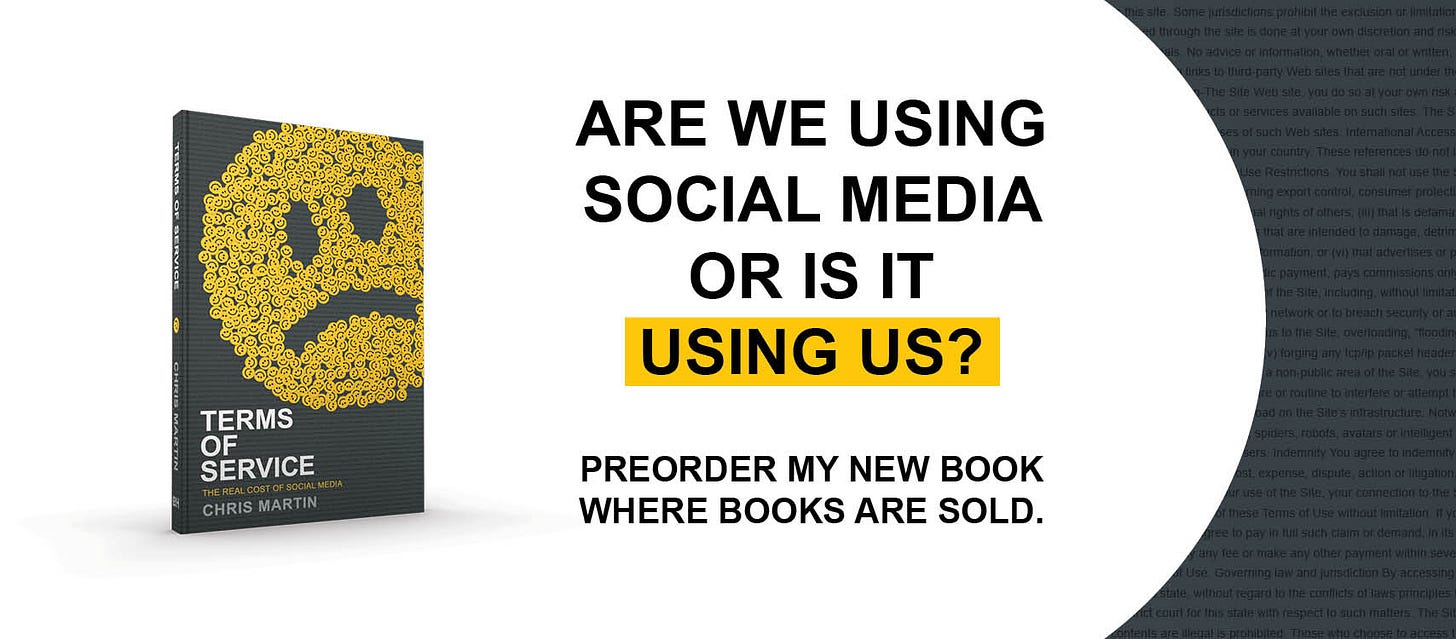3 Ways to Use Social Media More Wisely in 2022
It's all about intentionality.
I am far from a paragon of virtue when it comes to social media use. I have been on social media in some form since I was in elementary school (AOL Instant Messenger), which means I have demonstrated my fair share of foolishness the past couple of decades. Even as an adult I have used it in some pretty immature, unwise ways.
A new year is an opportunity to reset our routines and explore how we may have a fresh start in any area of our lives. Sure, we can always press the reset button, whether in March or May or August, but the rest of the holiday season and reset of a new year provides a psychological push toward healthier habits in whatever areas we choose.
Social media is at the center of our lives in more ways than we often realize, so I think it would be wise for us to examine the role of social media in our days and do what we can to use it more wisely. How might we do that? I could list a dozen ways, but here are just three, and they all revolve around one principle: intentionality.
1. Spend less time on social media.
First, isn’t it funny that one of the best ways we can use social media more wisely is to use it less often?
This idea may be a bit obvious and may cause you to roll your eyes, but I really mean it—if we want to have a more healthy relationship with social media, we probably need to be using it less.
I say probably because I don’t know how much you use social media, but most Americans use social media for a couple of hours every day. What if we just cut that in half? How could we better use that extra hour of our day? How many more books could we read with an extra hour a day not spent scrolling Instagram?
Spending too much time on social media can lead us to care too little about the events of our immediate contexts and too much about matters totally out of our control.
For instance, someone who spends too much time on social media may be so preoccupied with the racial injustice on display in a major metropolitan area hundreds of miles away that they ignore the reality that payday loan places continue to prey on the minority and immigrant communities in their own town. Or perhaps it looks like being so preoccupied with past leadership abuses in American evangelicalism on the other side of the country that we don’t work to become the kinds of leaders we hope would prevent such malpractices.
Social media can be a helpful tool, but used without much thought it is more likely to be a tremendous distraction from more important matters, or at least matters about which we may take some kind of meaningful action. Set screen time limits. Grow in discipline. Commit to be less frequently blown and tossed by the winds of social media in the coming year. Invest more time in offline matters than online matters.
2. Avoid conflict online at all costs.
When I graduated from college and took a job at a Christian organization managing the social media of a public thinker in evangelicalism, it was part of my job to pay close attention to conversations and cultural movements within the Christian neighborhoods of social media. At the time, I was still immature enough to think it wise to insert myself and my wealth of wisdom at 22-years-old into whatever it was Christians were arguing about online on any given day.
As I have aged, generally matured, and have come to better understand the social dynamics of the social internet, I look back on my voluntary service in the Christian social media wars and wonder, “What was I thinking?”
The truth is that I wasn’t thinking. I was just reacting. Such is the posture of someone who uses social media with the same level of thoughtfulness that teenager possesses when purchasing Axe body spray—common, but regrettable.
What I learned from my more immature days of excitedly fighting on the internet, and in the more peaceful days since, is that engaging in conflict on the internet is so rarely helpful that is is best avoided entirely. Little if any spiritual edification or general personal development is missed if we opt out of fighting with other people on the internet.
The most important issues of our day, whether theological (like the nature of the Trinity), sociological (like systemic racism), or otherwise are debased by their debate on social media. Social media is a trivial medium meant for trivial content, and we trivialize important matters when we bat them around on the social internet. The most important issues of our day ought not be so disrespected to be dragged out for conversation on these platforms under the illusion that actual, meaningful debate or discussion could be had around them. Such meaningful discussion is incredibly rare.
Beyond avoiding conflict, though, we ought to think intentionally about the role social media platforms play in our lives.
3. Decide what social media is meant to accomplish in your life.
Ask yourself this question: “What do I want [social media platform] to do for me?” Or, another way to ask the same kind of question is, “When I use [social media platform] what do I hope to find?”
Believe it or not, when I ask people this question, there is at least a moment of stuttered silence, often followed by something like, “Uhh. Hm. I don’t think I’ve ever thought about that before.” This isn’t altogether surprising—most of us just sign up for these social platforms because of some warped fear of missing out, not because we have any thought of how they may actually enrich our lives. By not actively seeing social media platforms as tools we use for personal enrichment or edification we become victims of their influence rather than using them for intentional purposes. This begins a long, perilous slide toward social media invading every nook and cranny of our lives. When we don’t have a plan for it, when we sign up without any mind toward its goal or purpose in our lives, it just takes over.
I am far less interested in our answers to the above questions than I am interested that we simply ask them. Generally, it is not good to hope that your relationship with social media hurts yourself or others. But I don’t care if you hope to find delicious recipes on Instagram or funny jokes on Twitter or political discourse on Facebook. I do care that we all ask, “What am I hoping comes out of my relationship with [social media platform]?”
When we ask what we hope to gain from our relationships with our preferred social media platforms, we are at least one step closer to using these platforms with intentionality.
For instance, a number of years ago, I saw social media as a way to debate with people across the theological and political spectrum as a means of sharpening my own mind and perhaps growing a bit of a reputation as a young, snappy thinker. Around 2016, a few years into playing that game, I asked myself some form of the questions I am suggesting we ask here, and I realized that I was using social media unintentionally and just as a reactive means of opinion expression.
Twitter is the social media platform I use most often. So when I asked myself, “When I use Twitter, what do I hope to accomplish?” My answer was, “I hope to laugh at funny jokes, learn about topics that interest me, and have constructive conversation around those same topics.” That’s why, around that time, I unfollowed all news outlets on social media, blocked, muted, or unfollowed people that tempted me to angrily argue, and just focused on the content that was interesting to me (funny jokes, commentary on video games, sports, social media, and other topics of interest).
By explicitly deciding what I wanted my preferred social media platform to accomplish, I not only started using social media more wisely, but I also just started to enjoy it more.
If your social media feeds are overly negative, that’s a you problem. Of course, as I have written in this newsletter countless times and ways before, social media is bent toward negativity, but you do have the ability to decide who you do and do not follow. Make a change if you have to, especially if the negative people and content are hindering you from seeing social media accomplish what you hope it would accomplish in your life.
If you’ve found this helpful, would you consider preordering my book, also called Terms of Service? You can do so here, or wherever you prefer to purchase your books. It releases in less than a month, on February 1.



